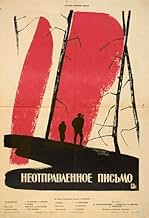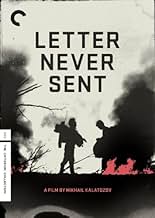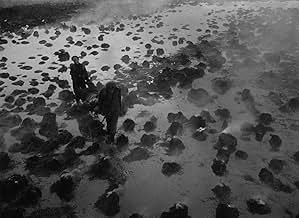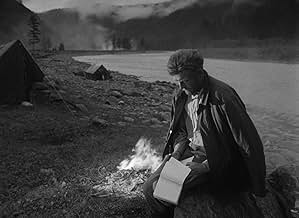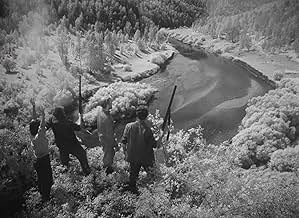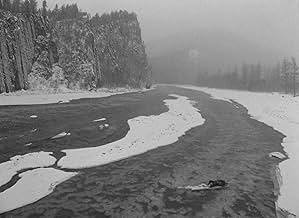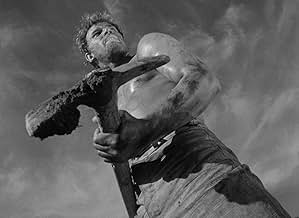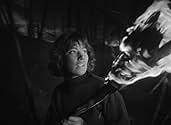AVALIAÇÃO DA IMDb
7,8/10
4,7 mil
SUA AVALIAÇÃO
Quatro geólogos procuram diamantes em um território selvagem da Sibéria.Quatro geólogos procuram diamantes em um território selvagem da Sibéria.Quatro geólogos procuram diamantes em um território selvagem da Sibéria.
- Direção
- Roteiristas
- Artistas
- Prêmios
- 1 indicação no total
Innokentiy Smoktunovskiy
- Konstantin Sabinin
- (as I. Smoktunovskiy)
Tatyana Samoylova
- Tanya
- (as T. Samoylova)
Vasiliy Livanov
- Andrey
- (as V. Livanov)
Evgeniy Urbanskiy
- Sergey Stepanovich
- (as Ye. Urbanskiy)
Galina Kozhakina
- Vera
- (as G. Kozhakina)
Avaliações em destaque
In Mikhail Kalatozov's Letter Never Sent, four geologists are searching for diamonds in the wilderness of Siberia. Three men, one woman. Andrei and Tanya are in love. Sergei is in love with Tanya. Sergei is a strong man who had been on such expeditions but had returned with no luck. He is jealous of the nerdy Andrei's and the beautiful Tanya's relationship but never cares to hide that feeling. Sabinine (The Leader of the expedition) often spends his free time writing letters, which he will never send, to the woman he once loved. This is how the film begins: By presenting a set of characters, each having different perspectives but are present in the wild forests of Siberia for one reason. With the hope of serving their country, they are present there hunting for a diamond vein. It's no surprise that the diamond deposit is discovered in the film after days of hard work. Previous expeditions had failed but this one expedition proved that there indeed was a diamond deposit in Siberia. Soon, the four geologists, filled with zeal and satisfaction, find themselves engulfed by a huge forest fire and completely cut of from the civilized world. Will they survive?
Before the opening credits, the film pays tribute to the people of the Soviet Union who have given their lives for the benefit of the country, whether it be astronauts seeking answers for the mysteries of space or geologists going in to the wilderness hunting for diamonds. Throughout the entire film, we see the characters suffering in the piercing cold and bleak atmosphere of Siberia. Their goal at this point is to safely deliver the map, on which the whereabouts of the diamond deposit is marked, to Moscow. We see sacrifice. We witness loss. We witness alienation, hunger, despair. This is where I realized that similar to numerous Soviet films, Letter Never Sent contains shards of Propaganda. Adventure? Nope. I look at this one as a miserable survival film filled with some unnecessary moments of melodrama, patriotism and hyperactivity. The fact is that I don't mind patriotism and propaganda. But in this case it's overdone. I just didn't care for any of the characters. Not even the gorgeous Tatiana Somailova whose performance in the 1957 Soviet Classic The Cranes are Flying (Also directed by Mikhail Kalatozov) was spellbinding. It was because of this film that I was intrigued to check out Letter Never Sent.
Now the big question: What relation does the film and it's title have? As stated earlier, Sabinine wrote letters to a woman he loved from his past. He wrote them, feeling nostalgic, without the intention of sending them (Of course, the team is already in the middle of nowhere). This relation is explained further in the final moments of the film but it's significance is again directed more towards patriotism, in my opinion. Another disappointing aspect.
Unlike the ingenious masterpiece The Cranes are Flying, this film lacks true emotions. I went in with high hopes of seeing another Soviet masterpiece but eventually I was left disappointed. Albeit this film failed to emotionally engross me, Sergei Urusevsky's miraculous cinematography makes the film worth watching. Urusevsky and Kalatozov have collaborated in multiple films and their most well known work is of course The Cranes are Flying, where the film used astonishing camera- work. Though I believe Letter Never Sent takes it to a whole new level by composing unbelievable images. The camera work is well ahead of it's time. It looked like that the camera glided through the wild fire and the horrible blizzards very smoothly. The technical artistry of this film deserves a standing ovation and at times it completely overpowers the dissatisfying screenplay.
On the positive side, Letter Never Sent is one of the strongest proofs of how visually powerful cinema can be. If you ever tell me to compile a top 10 list of the most visually stunning films ever crafted, this one will gladly make it to the top 5. Mr. Urusevsky, you rock. (And I will highly recommend The Cranes are Flying in case you haven't seen it yet).
filmsmostbeautifulart.blogspot.in
Before the opening credits, the film pays tribute to the people of the Soviet Union who have given their lives for the benefit of the country, whether it be astronauts seeking answers for the mysteries of space or geologists going in to the wilderness hunting for diamonds. Throughout the entire film, we see the characters suffering in the piercing cold and bleak atmosphere of Siberia. Their goal at this point is to safely deliver the map, on which the whereabouts of the diamond deposit is marked, to Moscow. We see sacrifice. We witness loss. We witness alienation, hunger, despair. This is where I realized that similar to numerous Soviet films, Letter Never Sent contains shards of Propaganda. Adventure? Nope. I look at this one as a miserable survival film filled with some unnecessary moments of melodrama, patriotism and hyperactivity. The fact is that I don't mind patriotism and propaganda. But in this case it's overdone. I just didn't care for any of the characters. Not even the gorgeous Tatiana Somailova whose performance in the 1957 Soviet Classic The Cranes are Flying (Also directed by Mikhail Kalatozov) was spellbinding. It was because of this film that I was intrigued to check out Letter Never Sent.
Now the big question: What relation does the film and it's title have? As stated earlier, Sabinine wrote letters to a woman he loved from his past. He wrote them, feeling nostalgic, without the intention of sending them (Of course, the team is already in the middle of nowhere). This relation is explained further in the final moments of the film but it's significance is again directed more towards patriotism, in my opinion. Another disappointing aspect.
Unlike the ingenious masterpiece The Cranes are Flying, this film lacks true emotions. I went in with high hopes of seeing another Soviet masterpiece but eventually I was left disappointed. Albeit this film failed to emotionally engross me, Sergei Urusevsky's miraculous cinematography makes the film worth watching. Urusevsky and Kalatozov have collaborated in multiple films and their most well known work is of course The Cranes are Flying, where the film used astonishing camera- work. Though I believe Letter Never Sent takes it to a whole new level by composing unbelievable images. The camera work is well ahead of it's time. It looked like that the camera glided through the wild fire and the horrible blizzards very smoothly. The technical artistry of this film deserves a standing ovation and at times it completely overpowers the dissatisfying screenplay.
On the positive side, Letter Never Sent is one of the strongest proofs of how visually powerful cinema can be. If you ever tell me to compile a top 10 list of the most visually stunning films ever crafted, this one will gladly make it to the top 5. Mr. Urusevsky, you rock. (And I will highly recommend The Cranes are Flying in case you haven't seen it yet).
filmsmostbeautifulart.blogspot.in
A quite ridiculous film about diamond hunters in Siberia by the extraordinary director/cinematographer team of "I Am Cuba" and "The Cranes Are Flying." Needless say, the camerawork in the bizarrely surreal and barren Siberian locations is UNBELIEVABLE (the continuous takes are longer than any other film in history except for "I Am Cuba") but the film itself is too directly tied to dramatic 'adventure story' conventions to transcend into pure poetry like "Cranes" and "Cuba." There is a spectacular scene shot with the main actors amidst a raging forest fire and another one shot during an ice-storm. Most definitely worth transferring to DVD (there isn't a true film fan that wouldn't be flabergasted by the cinematography) but not by the same ones (Hen's Tooth) who did such a mediocre job on the transfer of "I Am Cuba."
Among a panoply of scintillating things about this film is Sergei Urusevsky's deft black-and-white cinematography, much of it hand-held. Urusevsky seems to understand semiotics deeply, and his shots are often protean, shifting angle or perspective during a take to wring extra emotional import from it. I found myself rewinding many sequences and rewatching because of how well Urusevky, arguably the greatest Soviet era lensman, can minimally change vantage or tilt and bring fresh meaning cascading from the actors.
"Letter Never Sent" has communistic political messages in it, but is sumptuously acted by a small cast with a good sense of ensemble. Heat and cold, fire and ice, land and water, remote wildness and safe civilization all exist here in dynamic tension. The version in digital circulation is lovingly restored. A must-watch, especially for admirers of other quintessential Russian filmmakers such as Tarkovsy.
"Letter Never Sent" has communistic political messages in it, but is sumptuously acted by a small cast with a good sense of ensemble. Heat and cold, fire and ice, land and water, remote wildness and safe civilization all exist here in dynamic tension. The version in digital circulation is lovingly restored. A must-watch, especially for admirers of other quintessential Russian filmmakers such as Tarkovsy.
This robust survival adventure follows a team of Soviet geologists stranded in the wilderness of Siberia after a forest fire severs their communication link with civilization. The opening dedication to Socialist heroes everywhere and the noble sacrifices made by each character carry the story dangerously close to propaganda, but the intensity of their ordeal (through smoke and fire, over snow and ice, across mountains and tundra) thankfully overwhelms the political simplicity of the script. Unfortunately, it also overwhelms the initial hints of tension between each of the four characters (three male, one female) after the struggle to survive becomes paramount. The sense of isolation and exposure is numbing; the film was directed with a strong sense of visual drama (including more than one knockout montage), showing everything an audience would ever want to know about being lost in Siberia.
Loss, purpose, and redemption, all in this harrowing adventure and visual tour-de-force by usual suspects Kalatozov/ Urusevsky.
An expedition of diamond hunters is dropped in the Siberian plateau with the mission of discovering a rumoured diamond vein. In the course of the movie diamonds acquire a further symbolic aspect as the purpose in life. As the expedition is befallen by a raging fire and forced to make a hazardous escape through burning logs, saving the map which points to the location of the much sought-after diamonds becomes a struggle to preserve purpose and meaning in a world that defies it. As the surviving members of the expedition stagger through the charred landscape, amidst billows of smoke and torrents of rain, nothing there to answer their pleas and curses but the echo of their voices, the world seems indifferent to their plight.
The star of the movie however is Urusevsky's cinematography. Kalatozov fails to harness his tremendous visual talent as he did in THE CRANES ARE FLYING, certain scenes flailing for attention but lacking the dramatic pull to justify them, but still someone who likes movies for their pictorial quality, for the endless possibilities of capturing images with a photographic lens and moving inside a thridimensional canvas; such a person will be left in awe and admiration of what Urusevsky achieves. His rapid tracking shots through branches of trees, as though the nature conspires to ensnare the protagonists, the amazing clarity of the closeups, the maize of hand-held shots thrusting the viewer right there in the middle of the action, the beautiful dutch angles transforming the geography of the landscape into something that can only exist for and by the camera.
Although the plot has its heart in the right place, much like its predecessor, it suffers from being too overwrought and from lapsing into moments of melodrama. Plot threads that are emphasized early on, like Sergei's unrequisite love and the growing tension with Tanya, are never really resolved and come to a screeching halt when the fire erupts. Traditional Soviet values, like the leader's dream of a Diamond City and the portrayal of civilization as a collective good, don't chime with my sensibilities. The score is often jarring and obtrusive but that's 50's cinema for you.
Overall this is a visually marvellous film aimed at the cinephiles who can appreciate such things.
An expedition of diamond hunters is dropped in the Siberian plateau with the mission of discovering a rumoured diamond vein. In the course of the movie diamonds acquire a further symbolic aspect as the purpose in life. As the expedition is befallen by a raging fire and forced to make a hazardous escape through burning logs, saving the map which points to the location of the much sought-after diamonds becomes a struggle to preserve purpose and meaning in a world that defies it. As the surviving members of the expedition stagger through the charred landscape, amidst billows of smoke and torrents of rain, nothing there to answer their pleas and curses but the echo of their voices, the world seems indifferent to their plight.
The star of the movie however is Urusevsky's cinematography. Kalatozov fails to harness his tremendous visual talent as he did in THE CRANES ARE FLYING, certain scenes flailing for attention but lacking the dramatic pull to justify them, but still someone who likes movies for their pictorial quality, for the endless possibilities of capturing images with a photographic lens and moving inside a thridimensional canvas; such a person will be left in awe and admiration of what Urusevsky achieves. His rapid tracking shots through branches of trees, as though the nature conspires to ensnare the protagonists, the amazing clarity of the closeups, the maize of hand-held shots thrusting the viewer right there in the middle of the action, the beautiful dutch angles transforming the geography of the landscape into something that can only exist for and by the camera.
Although the plot has its heart in the right place, much like its predecessor, it suffers from being too overwrought and from lapsing into moments of melodrama. Plot threads that are emphasized early on, like Sergei's unrequisite love and the growing tension with Tanya, are never really resolved and come to a screeching halt when the fire erupts. Traditional Soviet values, like the leader's dream of a Diamond City and the portrayal of civilization as a collective good, don't chime with my sensibilities. The score is often jarring and obtrusive but that's 50's cinema for you.
Overall this is a visually marvellous film aimed at the cinephiles who can appreciate such things.
Você sabia?
- CuriosidadesIn 1995 the film was restored by and shown in United States upon the financial support from Francis Coppola.
- Citações
Andrey: Sergei, you've fallen in love with a girl who loves someone else, and that man loves her. From the moral standpoint it's wrong.
Sergey Stepanovich: I don't give a damn about your bookish morale. I'm in love.
Andrey: That's an egoist speaking.
- ConexõesFeatured in Fejezetek a film történetéböl: A szovjet film 1953-1970 (1990)
Principais escolhas
Faça login para avaliar e ver a lista de recomendações personalizadas
- How long is Letter Never Sent?Fornecido pela Alexa
Detalhes
- Data de lançamento
- País de origem
- Central de atendimento oficial
- Idioma
- Também conhecido como
- Letter Never Sent
- Locações de filme
- Mosfilm Studios, Moscou, Rússia(Studio)
- Empresa de produção
- Consulte mais créditos da empresa na IMDbPro
- Tempo de duração
- 1 h 36 min(96 min)
- Cor
- Mixagem de som
- Proporção
- 1.37 : 1
Contribua para esta página
Sugerir uma alteração ou adicionar conteúdo ausente

